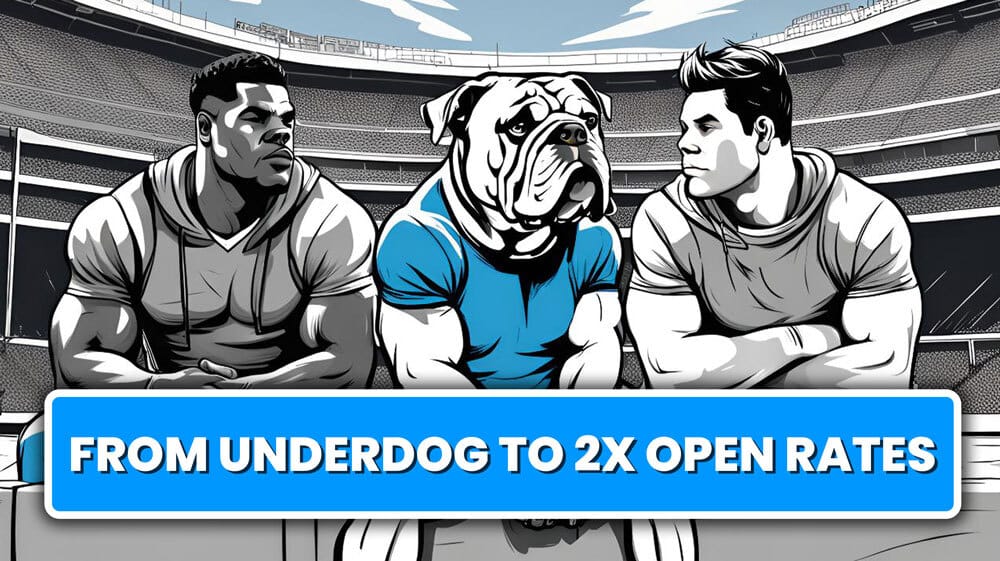Let’s talk about something most newsletter operators know they should do… but rarely do well:
👉 Stop sending to people who don’t want your emails.
That’s the heart of what I call the Base Sending Segment—and it’s the single most important lever we use to protect deliverability and scale engagement across our media network.
It’s also the strategy that helped Tyler O’Shea from The Underdog Newsletter bounce back from flatlining open rates, fix his inbox placement, and 2X his weekly engagement.
More on Tyler in a second—but first, let’s unpack the system.
🧠 What is a Base Sending Segment?
The Base Sending Segment (BSS) is the minimum viable audience you can reliably inbox.
It’s the tight, clean group of subscribers who are actually engaging with your content or have recently subscribed to your list.
Think:
Clickers in the last 30-60 days
High-frequency openers across recent sends
Subscribers who just signed up to get the deets
Why it matters:
Email providers like Gmail don’t care how big your list is. They care who’s interacting.
The more you send to unengaged subscribers, the more signals you send that your content is irrelevant—which gets you filtered, throttled, or worse… blocked.
“Inbox placement is earned. Not assumed.”
🛠️ How It Works in Practice
1) Set up Your Base Sending Segment (BSS)
This is your safest, highest-signal group.
Standard Model: 60/30/10 (Daily Newsletter)
Clicked in the last 60 days OR
Opened in the last 30 days OR
Added in the last 10 days

IMPORTANT: Adjust based on your sending frequency and performance. If you send only during the weekdays or once a week, your engagement timeline could be much longer. On the other hand, if you are sending twice per day, it should probably be a shorter window.
2) Send to BSS Only
If inboxing is a privilege, the BSS is your VIP list. No ticket? No entry.
Suppress all other subscribers
Focus on the highest intent + best deliverability signals
3) Monitor Deliverability
Even the cleanest list can crash if you’re not watching the gauges. Keep your eyes on the inbox altimeter.
Track inbox placement (especially Gmail)
Watch for:
Open rate drops
Deferrals/bounces
Increased spam reports

4) If Inboxing is Healthy → Expand
If the inbox lights are green, it’s time to open the throttle—carefully.
Add dormant segments with historical engagement:
5+ clicks in the last 120 days
10+ opens in the last 90 days
Slowly reintroduce previously suppressed leads
5) If Inboxing Drops → Contract
If your inbox placement starts slipping, it’s time to tighten the belt and fly light.
Strip BSS to:
Reduce engagement windows
Perhaps only sent to recent clickers only
Suppress all domains being deferred, then slowly open them up.
6) Subscribers with No Engagement
If they’re not clicking, they’re not listening. One last nudge—then it’s time to cut the cord.
Enter a final winback automation
If still no clicks or opens → Delete permanently
That’s the basics.
Now let’s break down how Tyler O’Shea used this strategy to 2x his engagement and started scaling his newsletter.
🎙️ How Tyler Used the BSS to Rebuild The Underdog Newsletter
A few months ago, Tyler reached out.
His open rates were dipping.
Beehiiv was flagging his account.
He was sending to his whole list because, like a lot of creators, he didn’t know what else to do.
So we built his BSS.
✅ Started sending only to recent openers, clickers and newly added subscribers.
✅ Rebuilt reputation slowly, tracking Gmail performance week by week (went from Medium domain rep to High)
✅ Shifted his mindset from “full list reach” to “real audience results”
“I was hesitant at first. But now my list is smaller, more engaged, and honestly… way more profitable.”
Here’s what happened:
His open rate shot past 55%
Deliverability stabilized
Engagement nearly doubled
And now he’s sending more emails to more people who actually want them
📈 That’s how growth works when it’s based on signal—not spray and pray.
🔗 Want the Full Breakdown?
I sat down with Tyler for a full podcast episode where we walk through:
How he implemented the BSS
What changed in his deliverability
How Beehiiv flagged his list (and how he fixed it)
Why most newsletters are way too slow to cut dead weight
🎧 Listen to the full podcast below

FULL PODCAST: How Tyler O’Shea Fixed His Deliverability and 2X’d His Open Rates
🎧 Listen to Episode 2 Now: https://youtu.be/wD9t9-zZEf0

BEFORE YOU GO
Better Inbox Placement Starts Here
If your emails aren’t landing in the inbox, they’re not doing their job. I’ve seen too many brands struggle with deliverability issues without knowing why.
The truth is, a few key optimizations can make all the difference in getting your emails seen, opened, and clicked.

Remember… The Base Sending Segment isn’t a “one-time fix.”
It’s a new way of thinking about your audience:
That’s how you grow. That’s how you scale.
That’s how you inbox,
Chris Miquel
PS: Want help building your own BSS and recovering inbox placement? Hit reply. Happy to help.





